Touch Nothing is a chronicle where William Van Meter takes a fabulous person into a remarkable exhibit.
Last month New York was inundated with Pride activations. ATMs were adorned with rainbows and energy drink companies competed for the most chilled out rooftop DJ party. The focus was more on brand safety and satisfying allies’ comfort levels rather than speaking to the queer community. Meanwhile, Diesel sponsored a five-day erotic art extravaganza featuring more phalluses than Pompeii.
The Italian designer jeans brand has teamed up with the Parisian art association The community and the Tom of Finland Foundation to present AllTogether Clubhouse. The temporary space hosted an exhibition drawn from the foundation’s extensive LGBTQ+ art archive that shaped a very New York narrative in art and ephemera, as well as lectures, performances and parties galore. Basically, they made an edgy hangout, reminiscent of when Greenwich Village was a major queer neighborhood.
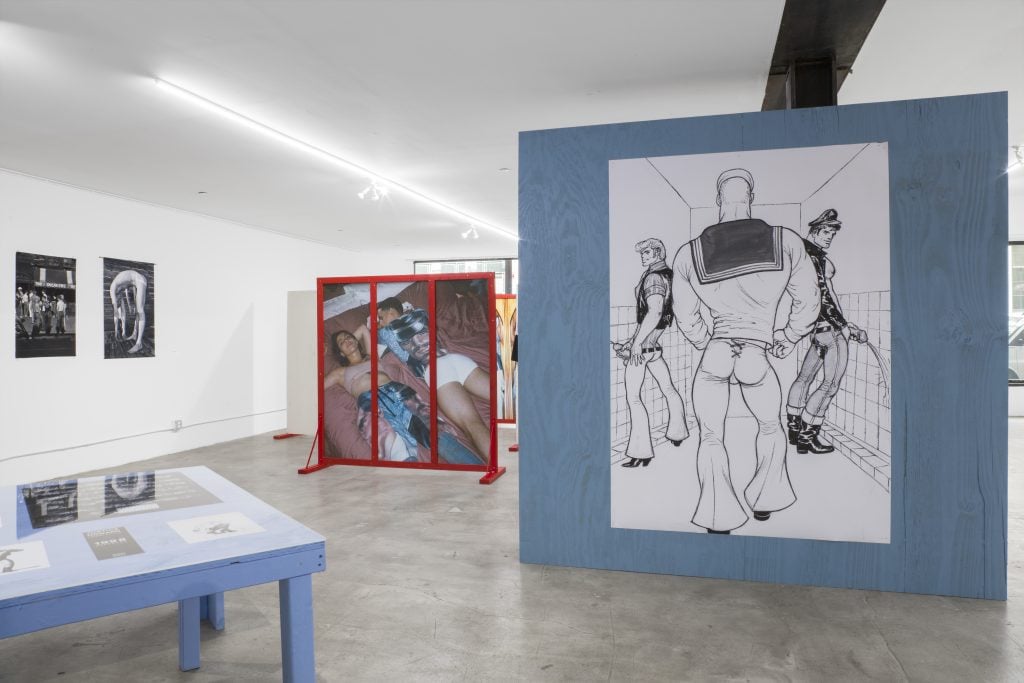
An installation view of AllTogether Clubhouse. A sailor arrogantly walks into a Tom of Finland bathroom scene on the right. Courtesy of Diesel.
“It’s important to be together,” said Diesel creative director Glenn Martens, who flew in from Paris for the boisterous opening. “It’s about community.” He then closed out the afterparty, a draw at the club in Queens these days, with a jaw-dropping DJ line-up.
“My brain is a little slack,” he said, but he was all smiles despite the lack of sleep. “I was like, airport, cocktail, drink, drink, drink, then I came here.” Diesel Pride collection is also derived from the artworks in the exhibition.
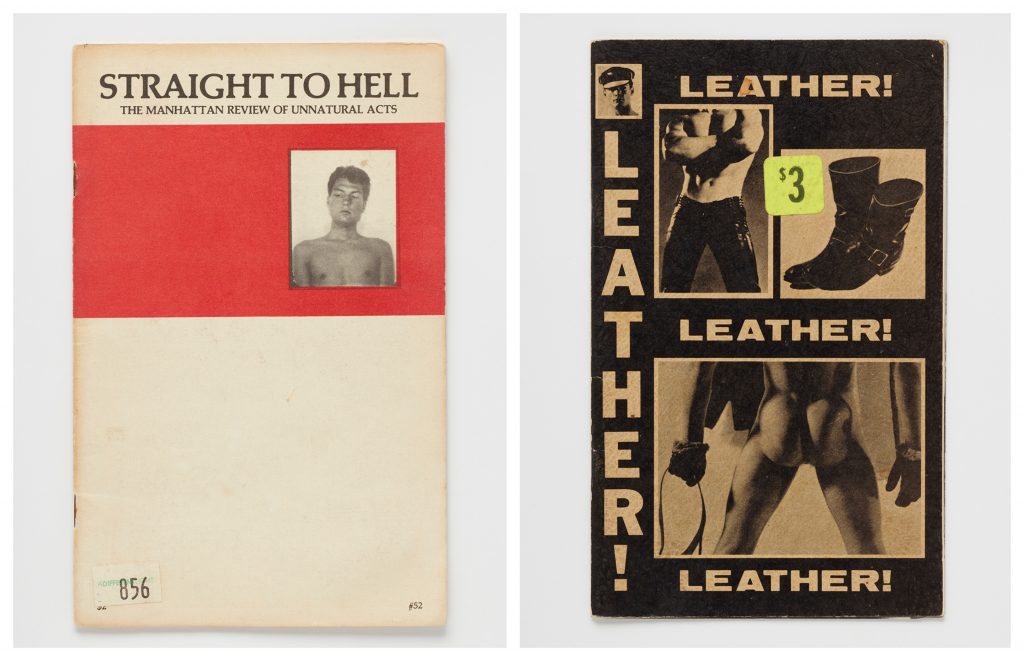
STH (Straight To Hell): Manhattan’s examination of unnatural acts. Number 52 (1983) and leather! (1965). Courtesy of the Tom of Finland Foundation.
Martens stood near a display case of vintage periodicals as Straight to hell, leather!, Mannish, and a portfolio for a long-defunct West Village queer gallery called Stompers. Martens wore loose, silky pants printed to look like jeans and an oversized plaid shirt of his own design. His Diesel aesthetic, which can veer fabulously from post-apocalyptic dystopia to 2001 North Florida raver, is taking over nightclubs around the world. But it’s not just an underground resurgence.

A mountainous pile of condom boxes served as the backdrop for Diesel’s Fall 23′ track. Courtesy of Diesel.
Martens is responsible for Diesel’s return to the upper echelons of fashion, but he’s not shy about sending hypersexual messages like this in the exhibit we’re visiting. The fall 2023 show used a backdrop of 200,000 boxes of condoms, while guests on its spring 2023 show received glass butt plugs as invites.
“Diesel has always been a sexy brand – you know, ‘For the successful life,'” Martens said, referring to the brand’s slogan. “What could be more successful than being HIV positive? I just really pushed some fuel in there to explore a bit more. But I mean, the most important thing it’s really about is having fun. Don’t give a shit. Take your life. Uh, nail everyone. Of course, being HIV positive is also linked to this.
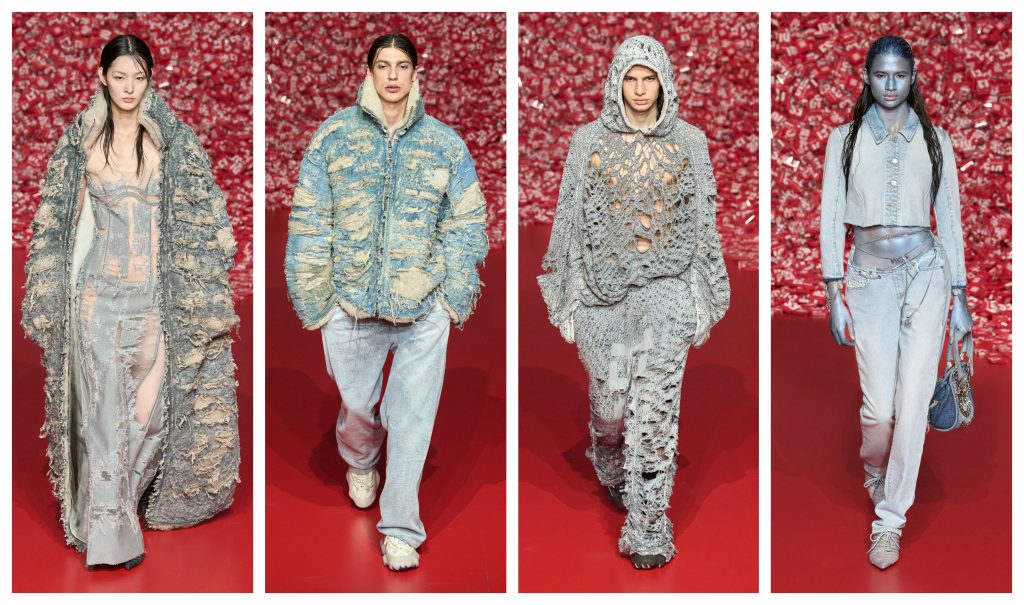
Ripped and impressed: looks from the Fall 2023 collection. Courtesy of Diesel.
Sex is a component of Martens’ work, but the brand’s brilliance (and charming nonchalance) can’t eclipse the design expertise that lies at the heart of its achievements. Instead of viewing Diesel’s denim staple as a constraint, he sees it as a universe, delivering collection after collection of deftly clever (and often outrageous) items that challenge the boundaries of what jeans could and should be.
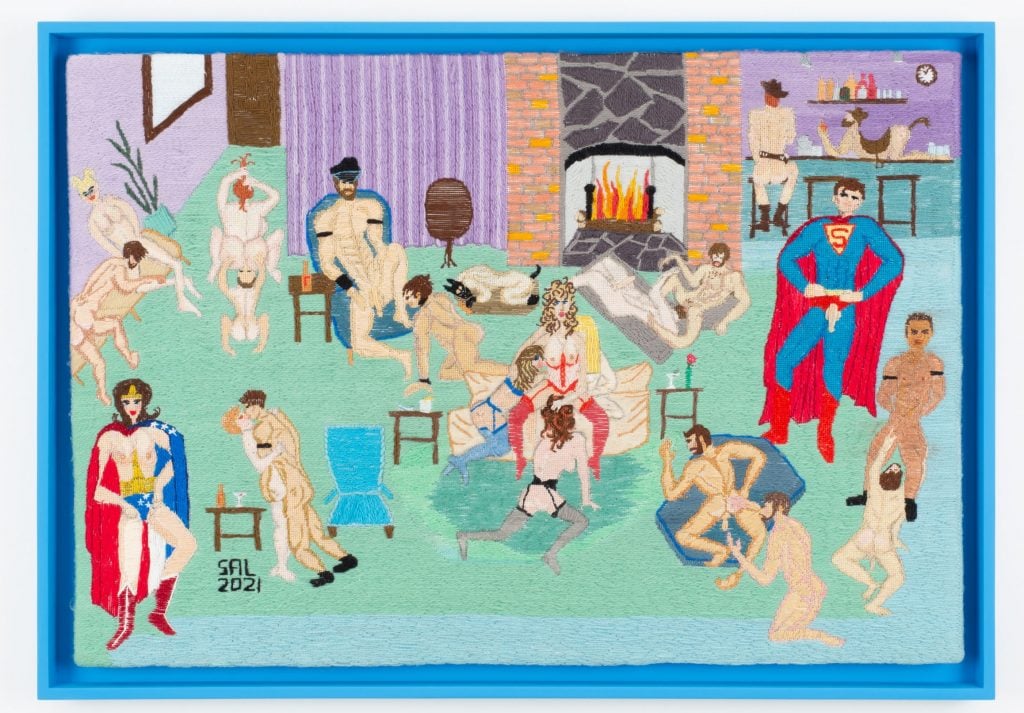
Sal Salandra, leather hell (2021). Courtesy of Club Rhubarbe.
We walked to a stitched-up depiction of a suburban orgy by artist Sal Salandra. It’s a cozy scene in front of the living room fireplace as the cartoon crime fighters get hot and heavy with their more conventional costumed counterparts (leather men, cowboys). “Don’t call it embroidery!” Martens warned. “He likes to call it thread painting. Met him yesterday, he’s a really fun big 77 year old bear. He’s going to give a one-hour seminar here tomorrow.
Martens was speaking in front of Jonathan Weinberg’s 1987 oil painting of a sex club at the height of the AIDS epidemic – a sign reading ‘Anal Oral Prohib’ stands in the foreground.
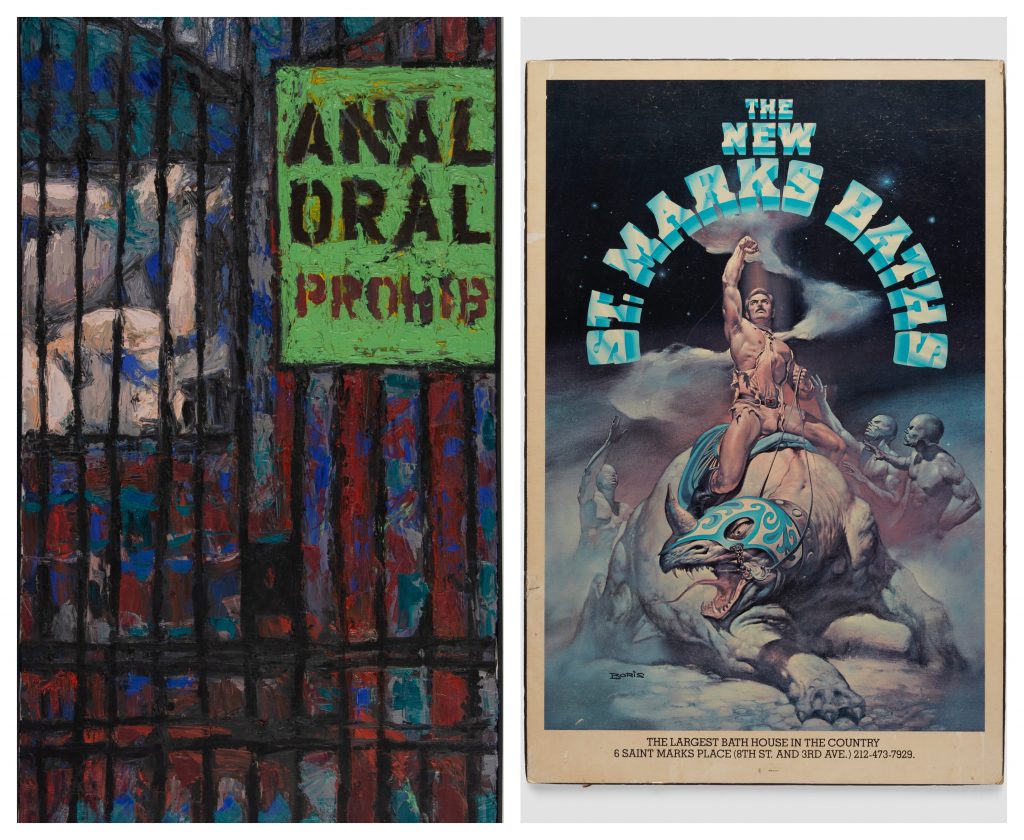
Left: Jonathan Weinberg, AnalOral (1987). Courtesy of the artist. Right: Poster for the New St. Marks Baths, New York, ca. 1980. Courtesy of the Tom of Finland Foundation.
We went upstairs and there was a vintage poster for St. Mark’s Baths (circa 1980) by famous sci-fi painter Boris Vallejo. It depicts a muscular barbarian riding a horned dinosaur. Fantasy elements aside, the dystopia would prove prophetic; by 1985, all gay bathhouses in Manhattan were closed. Public baths remain commonplace in Europe, but Martens, who divides his time between Paris and Milan, does not indulge in them.
“It’s been a long time since I’ve been in a sauna,” Martens said. “Everyone knows me, so I’m not really trying to say, ‘Hi, how are you?’ and being in my full front around the people I work with or something like that. But, I think it’s super fun! What I like is that it is free. Try as many things as you can and everyone respects each other. It’s fun to do all these things. I like the free spirit of a sauna consisting only of naked people. It’s very interesting.”
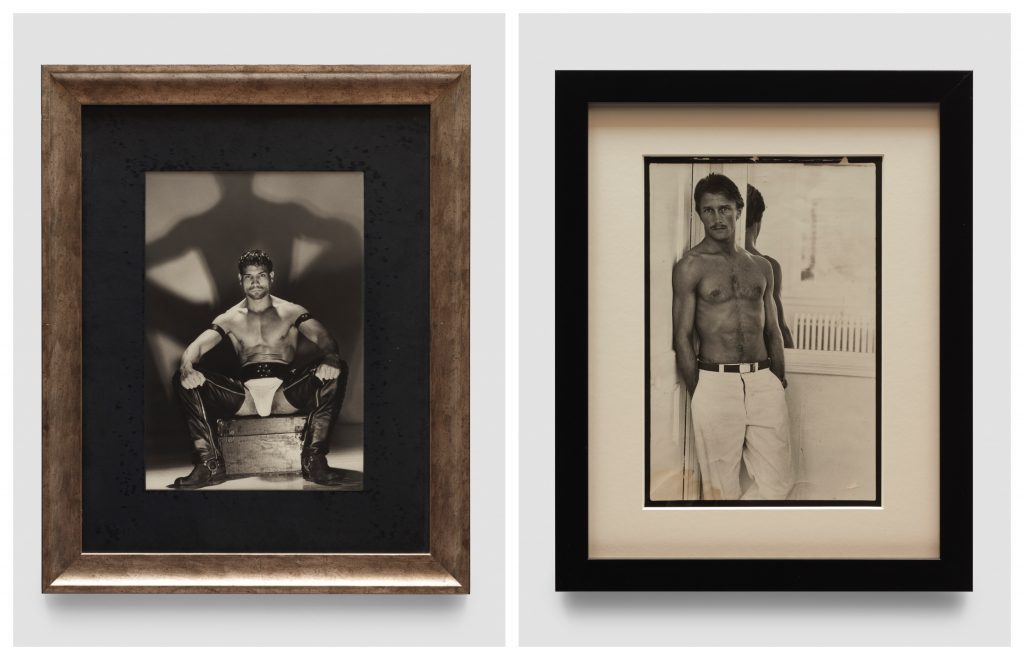
Left: Untitled (order for Honcho cover) (1996). Right: Bruce Weber, Untitled (Durk Dehner) (1976). Courtesy of the Tom of Finland Foundation.
On the wall of the AllTogether Clubhouse were various drawings by Tom of Finland depicting a bar, bathroom and racy outdoor paintings. “He was the very first super-famous sex-positive artist, really the original legend,” Martens said. “And he draws hot, sexy guys. You want to meet every person he drew. As we spoke, Durk Dehner, co-founder of the Tom of Finland Foundation, came over to say hello to Martens. Dehner was a close associate and romantic partner of the artist (who died in 1991) for over a decade and helped organize the exhibition. There is also a 1976 Bruce Weber photograph of Dehner on the ground floor of the space.
You could say that the gay male aesthetic is moving further and further away from the macho paradigm adopted by Tom of Finland, but the stature of the artist only seems to be growing. “They go beyond the outside,” Dehner said of the new generation of fans. “They see what the art represents. And that was his intention. What her work represents is freedom and love.
Follow Artnet News on Facebook:
